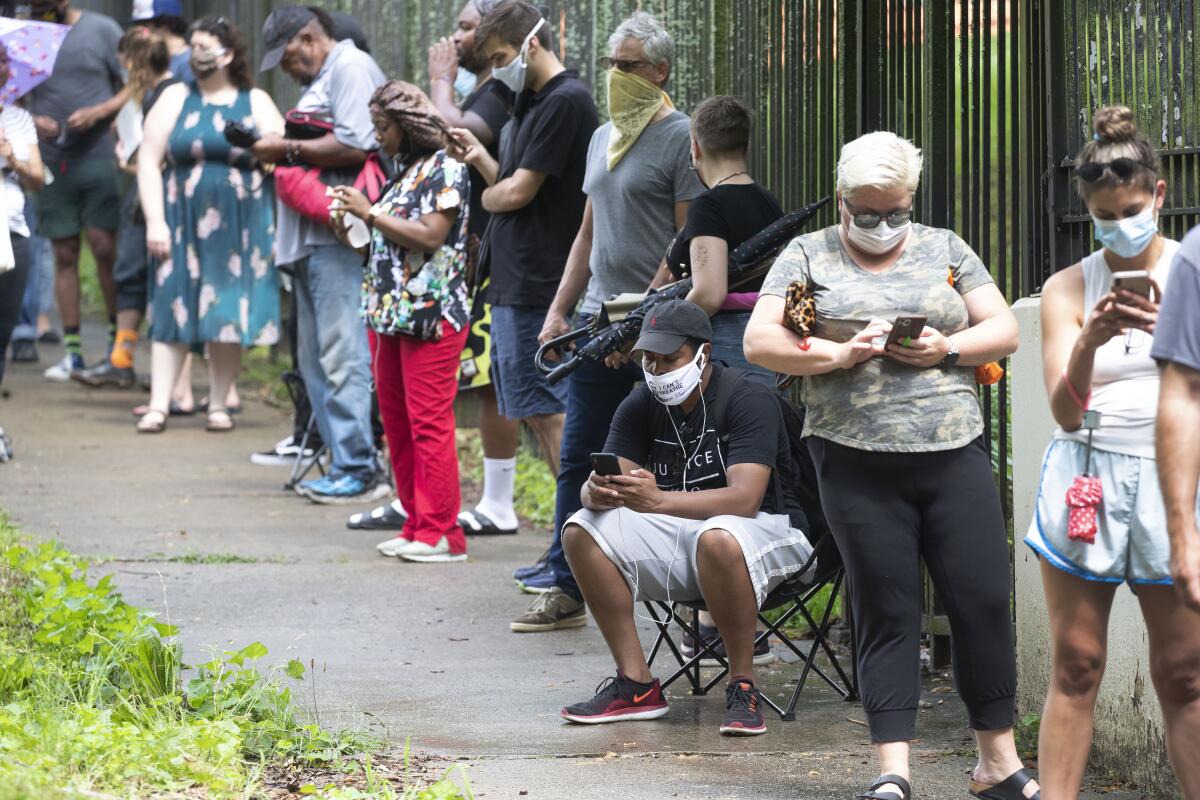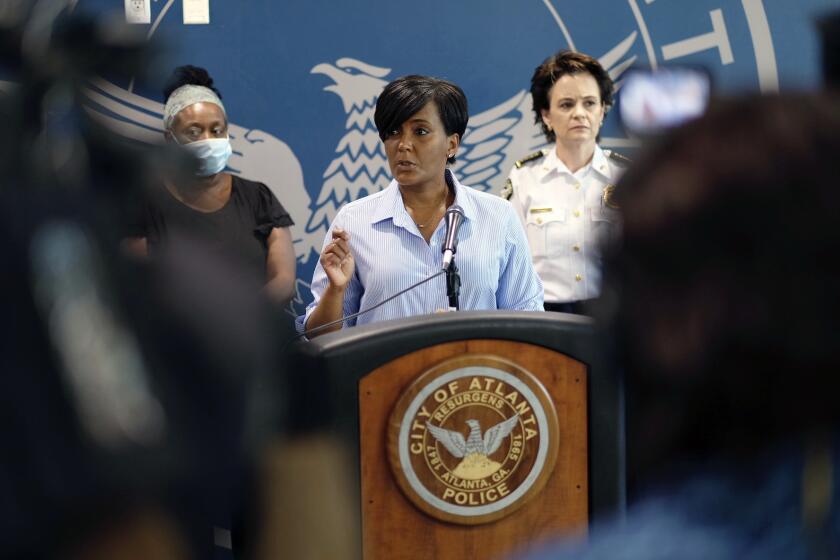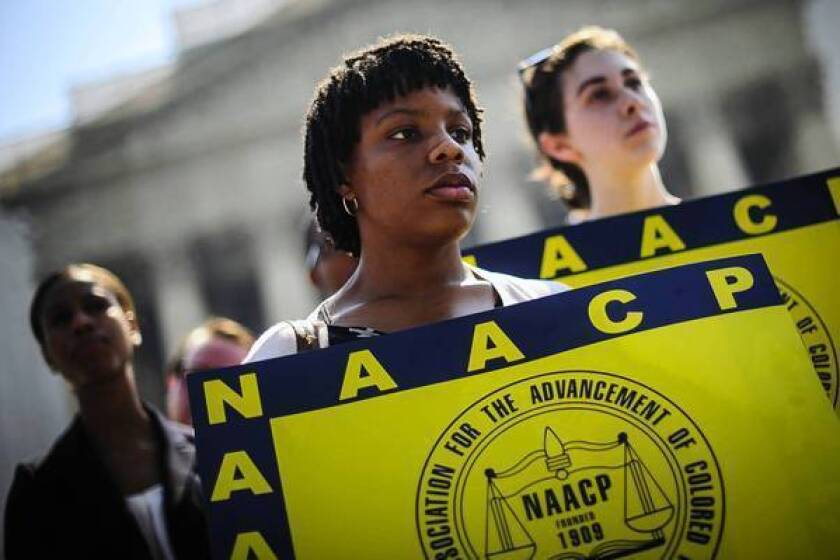Is the Georgia primary meltdown a warning for the November election?

- Share via
ATLANTA — The long-standing wrangle over voting rights and election security came to a head in Georgia, where a messy primary and partisan finger-pointing offered an unsettling preview of November’s contest, when battleground states could face a record turnout.
Many Democrats blamed Georgia’s Republican secretary of state for hours-long lines, voting machine malfunctions, provisional ballot shortages and absentee ballots failing to arrive in time for Tuesday’s elections. Georgia Republicans deflected responsibility to metro Atlanta’s heavily minority and Democratic-controlled counties.
It raised the specter of a worst-case November scenario: a decisive state, such as Florida and its “hanging chads” and “butterfly ballots” in 2000, remaining in dispute long after polls close.
Tuesday’s breakdown drew the second round of stinging criticism for Georgia election officials since 2018, when the state’s closely watched gubernatorial election was marred by hours-long waits at some polling sites, security breaches that exposed voter information and accusations that strict ID requirements and registration errors suppressed turnout. That led to lawsuits and changes to state law that included the $120-million switch to a new election system.
Much of the outcry over the 2018 election targeted Republican Gov. Brian Kemp, who still served as secretary of state when he ran for governor two years ago. Kemp has so far stayed silent on the most recent problems.
Like two years ago, activists say voting problems seemed to disproportionately affect areas with large numbers of minority voters in cities such as Atlanta and Savannah.
“We saw those overwhelming issues in Black and brown communities predominantly,” Aklima Khondoker, state director of the advocacy group All Voting Is Local, told reporters.
Votes were still being counted Wednesday, including absentee ballots that topped 1 million — the result of many voters trying to avoid trips to the polls because of the virus. The possibility of an August runoff loomed in a high-profile primary race among Democrats seeking to challenge GOP Sen. David Perdue, meaning Georgia voters could face another logjam at the polls in just two months.
Metro Atlanta appeared to have the worst voting delays, with some voters reporting five-hour waits and and others giving up and leaving in frustration when confronted with long, slow-moving lines. Voting hours were extended, and the last voters didn’t cast their ballots until around midnight.
Adia Josephson, a 38-year-old Black voter in the Brookhaven area just outside Atlanta, waited more than two hours to vote but wasn’t about to let the long lines stop her. Problems with voting machines and long lines must be corrected before the next election, she said.
“There’s no room for error,” she said. “There’s a lot to gain and a lot to lose.”
President Trump’s senior campaign counsel Justin Clark blamed Georgia’s vote-by-mail push amid the COVID-19 pandemic, and alluded to the president’s unfounded claims that absentee voting yields widespread fraud.
“The American people want to know that the results of an election accurately reflect the will of the voters,” Clark said. “The only way to make sure that the American people will have faith in the results is if people who can, show up and vote in person.”
Rachana Desai Martin, a Joe Biden campaign attorney, called the scenes in Georgia a “threat” to democracy. “We only have a few months left until voters around the nation head to the polls again, and efforts should begin immediately to ensure that every Georgian — and every American — is able to safely exercise their right to vote,” she said.
Martin stopped short of assigning blame, but two Georgia Democrats on Biden’s list of potential running mates pointed at Republican Secretary of State Brad Raffensperger, who led the selection of Georgia’s new voting machine system and invited every active voter to request an absentee ballot.
Atlanta Mayor Keisha Lance Bottoms’ response to the George Floyd protests is in the spotlight as she is being vetted as one of Joe Biden’s vice president possibilities.
Atlanta Mayor Keisha Lance Bottoms tweeted at Raffensperger about problems in pockets of metro Atlanta. “Is this happening across the county or just on the south end?” the Democrat asked, referring to an area with a heavily Black population.
Stacey Abrams, the 2018 Democratic nominee for governor and an Atlanta resident, said, “The blame rests solely and squarely on the shoulders of the secretary of state.”
Abrams established herself as a voting rights advocate after she refused to concede her 2018 race to Kemp because of voting irregularities.
“Georgia has seen this before,” Abrams told “CBS This Morning” on Wednesday. “Yesterday was the most egregious example.”
Voting rights groups, including Abrams’ Fair Fight Action, said Georgia’s experiences justified their efforts to combat what they described as a coordinated GOP push to restrict ballot access. Fair Fight, Priorities USA and American Bridge this week announced a “Voter Suppression Watch” partnership.
“Trump is already trying to extend this culture war by creating fear around vote-by-mail,” said Aneesa McMillan of the Priorities political action committee. She noted the Republican National Committee’s plans to recruit thousands of poll watchers now that the GOP was no longer under a court order banning the practice, which Democrats equate to voter intimidation.
“We have to learn our lessons, not just from Georgia, and protect the entire process,” McMillan said.
Georgia was one of nine states freed from federal oversight of their election laws when a divided Supreme Court in 2013 struck down a key part of the historic Voting Rights Act of 1965.
Supreme Court kills Voting Rights Act federal oversight provision
In an interview with the Associated Press, Raffensperger laid blame elsewhere, on “one or two counties,” saying state law charges counties with on-ground operation of elections. “It has nothing to do with what we’re doing in the rest of Georgia,” he said.
Raffensperger minimized problems that were documented in other counties and promised investigations of the handling of the primary by Fulton and DeKalb counties. The Republican speaker of Georgia’s state Legislature called for an investigation of the entire primary process but singled out Fulton County as “particularly” troubling.
That kind of back and forth, with white Republicans and Black Democrats from big cities trading barbs over voting issues, isn’t new. And it could easily be repeated in November in battleground states where Democrats and minority voters figure prominently in the most populous cities and counties: Philadelphia; Milwaukee; Broward County (Fort Lauderdale), Fla.; Wayne County (Detroit), Mich.; and Charlotte, N.C.
Fulton County’s local elections chief, Richard Barron, called Tuesday a “learning experience” while alluding to the state’s role in the primary process.
The finger-pointing goes beyond details of the law. Raffensperger correctly noted that county officials trained poll workers, including on the use of the new voting machines. But Raffensperger is the state’s chief elections official who decides how many machines to send to each county, and his office provides training curriculum for local officials.
On absentee ballots, he pushed unprecedented no-fault absentee access, paying to send an application to every Georgian on the active voter rolls. But no additional money was provided to hire staff to process the influx, which dwarfed the typical primary.
In the presidential primaries, Biden won, appearing alongside 11 other Democrats on ballots finalized months ago; Trump was the only choice on the Republican ballot.
More to Read
Get the L.A. Times Politics newsletter
Deeply reported insights into legislation, politics and policy from Sacramento, Washington and beyond. In your inbox twice per week.
You may occasionally receive promotional content from the Los Angeles Times.












